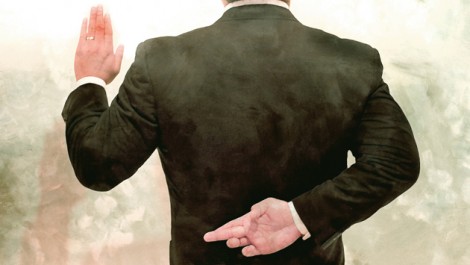Whether in relationships, business dealings, or everyday life, people lie to you all the time. And you probably lie to them, too! People lie for many reasons, including to gain someone’s respect, to avoid the consequences of our mistakes, to manipulate people into doing things that benefit us, to protect others, and sometimes even to be polite. Virtually everyone tells the occasional white lie, such as nodding when the boss asks if her horrific new haircut looks good or making up an excuse to get out of an unpleasant task – One University of Massachusetts study found that the average person lied two to three times in the course of a ten-minute conversation. But while white lies are commonplace and not considered to be particularly heinous, if an entire relationship is built on deceit, or if someone is taking credit for your achievements at work, you need to know. Fortunately, most liars give out conversational clues of deception that the average person can detect if they know what to look for. If you suspect someone is lying to you, look for the following major tip-offs.
1. Telltale body language
For most people, lying is difficult and unpleasant, and it is not possible to hide all of the physical giveaways. Body language experts have identified many involuntary responses and subconscious behaviors and that indicate deception. Although polygraph machines are able to detect very subtle physical signs, like sweating, muscle clenching, and elevated blood pressure, these changes can be hard to perceive with the naked eye. However, there are some telltale gestures common to liars that you might be able to pick up on just by observing someone. These include fidgeting or shuffling the feet to relieve tension; repeatedly reaching for a beverage or cigarette to combat dry mouth and/or nerves; and touching the face repeatedly. Face touching indicative of lying can include covering the eyes or mouth and/or rubbing the nose – according to body language expert Carol Kinsey Goman, the rush of adrenaline brought about by lying opens the capillaries in the nose, making it itch.
2. Unusual eye contact
Humans are notoriously bad at making eye contact while lying, so failure to make eye contact can be a major “tell” that someone is lying to you. However, the notion that liars avoid eye contact is so widely known that many people are careful to maintain eye contact with the person they’re lying to. Therefore, you should take note if someone makes too much eye contact when telling you something suspect, holding your gaze for an uncomfortably long time, as this can also be a sign of lying. According to Goman, liars also do the “quick check glance,” immediately looking down during or after the lie, and then looking back at you to see if you bought it.
Something else you might see in the eyes of a liar is dilated pupils, an involuntary giveaway that can be attributed to the increased concentration and tension involved with deceptive behavior. An abnormal blinking rate is another one – liars typically blink more slowly when lying and blink abnormally fast after telling the lie, says Goman.
3. Inconsistent facial expressions
As is the case with body language and eye contact, even when a lie is coming out of someone’s mouth, their body usually has a way of telling the truth. Nowhere is it harder to hide the truth than in one’s face. One major facial giveaway is the fake smile. The person is angry or upset that you caught them in a lie, but they try to smile to hide this fact and assure you that everything is OK. So how can you tell if a smile is real or fake? Again, it’s in the eyes. Genuine and forced smiles actually use two different facial muscles. The real, involuntary smile involves the orbicularis oculi muscle, which raises the cheeks and makes the eyes crinkle, whereas a fake smile only contracts the zygomatic major muscle, which simply raises the corners of the mouth and does not affect the eyes.
Microexpressions can be another sign that someone is trying to sell you a falsehood. Throughout a conversation, we make many involuntary microexpressions – brief expressions of anger, fear, happiness, sadness, disgust, surprise, and contempt. These expressions can be hard to catch, sometimes lasting only 1/25th of a second. When trying to determine whether someone is lying, look out for fleeting expressions that contradict verbal statements, such as the person furrowing their brows while telling you they’re happy.
4. Verbal cues
Now that we’re past the physical signs of lying, let’s move on to the verbal cues. While related to speech, verbal cues don’t necessarily have much to do with the content of what someone is saying, but rather, they are related to the tone of speech and language constructions. Like physical cues, verbal cues are often involuntary. One example is a rise in vocal pitch. This is a sign of stress, and experts note that this phenomenon is more likely to occur when someone is lying than when they are telling the truth. The use of phrases like “to be honest” or “to tell you the truth,” is also common among deceptive people who are trying (a little too hard) to convince you of their honesty.
The cadence, or rhythm, of someone’s speech is something else to listen for when gauging someone’s truthfulness. Do they give short, one-word answers? Do they take long pauses to collect their thoughts before answering questions, or try to buy time by repeating the question? These are all signs that the person may be lying to you.
5. Bad attitude
When confronting someone about a suspected lie, or even when asking an innocent question, the person being questioned will often display a defensive or even hostile attitude. They may even lash out at you, accusing you of lying or some other wrongdoing. A person who is trying to deceive you may avoid directly answering the question you asked and try to steer the conversation in a different direction, perhaps to the shortcomings of the accuser. For instance, they may retort with something like, “Why do you question everything I do? You need to work on your trust issues.” Besides being uncooperative in answering your question, when lying, people tend to act unpleasant and negative in general. According to psychologists Bella M. DePaulo and Wendy L. Morris, authors of The Detection of Deception in Forensic Contexts, liars are prone to make more complaints and negative statements compared with truth-tellers, and they often have an unfriendly, unpleasant attitude.
6. Tall Tales
Many times, the reason we might suspect someone of lying is not because of any physical or verbal behaviors they are displaying, but because of the content of their story itself. Sometimes, someone’s story just doesn’t add up. Perhaps it contradicts what another reliable person has told you, or – as is often the case – the suspected liar contradicts himself. In other cases, the person’s story might just be completely implausible. Alternatively, to avoid contradicting herself or having to come up with an elaborate lie that may lack plausibility, the liar will often tell a very vague story that is devoid of key details. Whether the story is short and vague or elaborate and contradictory, the best way to determine if it is fact or fiction is to ask questions and push for details. If, in response, the person displays any of the above-mentioned behaviors that indicate deception – takes long pauses when answering questions, becomes irritated or defensive – then there is a good chance that their story is an invention, and nothing more.
7. History
When a judge is sentencing someone for a crime and trying to determine if the person is genuine when they say they will clean up their act and stop committing crimes, one of the main things she takes into consideration is the criminal history of the accused. So, too, should you consider the history of someone who you suspect is lying to you. If they have lied to you before, there is a very strong chance that they are lying to you again. In other words, you want to consider the person’s character. It can be difficult to objectively evaluate someone’s character if you are close to the person and are deeply invested in the relationship, but discussing the matter with an outside party, preferably one who knows the suspected liar, can help provide an unbiased view of the person’s history when it comes to being deceptive.
8. Instincts
Sociopaths and skilled liars who lie frequently are good at not giving themselves away with body language, and they may be able tell a story so good that even a trained investigator wouldn’t be able to find a hole in it. People taking certain drugs and individuals who actually believe the fabrication they are telling may also be able to lie without displaying any signs of it. Nevertheless, you might just sense that something is off. Maybe your friend is just “not herself,” or you have an uncanny feeling that you need to protect yourself from a certain person, even if they are outwardly charming and genuine. Listen to your gut, because it is probably telling you something important.
Unfortunately, we often ignore our instincts that tell us someone is lying and choose to believe the liar, ignoring any troublesome inconsistencies or bad gut feelings. Psychologists say that the main reason people get away with telling lies is not because they are particularly skillful at lying, but because other people want to believe them. So, perhaps the best way you can get better at detecting the lies of others is by not lying to yourself.





